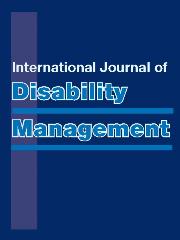Crossref Citations
This article has been cited by the following publications. This list is generated based on data provided by
Crossref.
James, Carole
and
Mackenzie, Lynette
2009.
Health Professional’s Perceptions and Practices in Relation to Functional Capacity Evaluations: Results of a Quantitative Survey.
Journal of Occupational Rehabilitation,
Vol. 19,
Issue. 2,
p.
203.
Gibson, Libby
2009.
International Handbook of Occupational Therapy Interventions.
p.
497.
Gibson, Libby A.
Dang, Monica
Strong, Jenny
and
Khan, Asad
2010.
Test-Retest Reliability of the GAPP Functional Capacity Evaluation in Healthy Adults.
Canadian Journal of Occupational Therapy,
Vol. 77,
Issue. 1,
p.
38.
Ashby, Samantha
Richards, Kailee
and
James, Carole
2010.
The effect of fear of movement on the lives of people with chronic low back pain.
International Journal of Therapy and Rehabilitation,
Vol. 17,
Issue. 5,
p.
232.
Spanjer, Jerry
Groothoff, Johan W.
and
Brouwer, Sandra
2011.
Instruments used to assess functional limitations in workers applying for disability benefit: a systematic review.
Disability and Rehabilitation,
Vol. 33,
Issue. 22-23,
p.
2143.
Schultz-Johnson, Karen
2011.
Rehabilitation of the Hand and Upper Extremity, 2-Volume Set.
p.
1812.
James, Carole
Mackenzie, Lynette
and
Capra, Mike
2011.
Inter- and intra-rater reliability of the manual handling component of the WorkHab Functional Capacity Evaluation.
Disability and Rehabilitation,
Vol. 33,
Issue. 19-20,
p.
1797.
Oesch, Peter
Meyer, Kathrin
Bachmann, Stefan
Hagen, Kåre Birger
and
Vøllestad, Nina K.
2012.
Comparison of Two Methods for Interpreting Lifting Performance During Functional Capacity Evaluation.
Physical Therapy,
Vol. 92,
Issue. 9,
p.
1130.
Oesch, Peter
Meyer, Kathrin
Jansen, Beatrice
Mowinckel, Petter
Bachmann, Stefan
and
Hagen, Kare Birger
2012.
What Is the Role of “Nonorganic Somatic Components” in Functional Capacity Evaluations in Patients With Chronic Nonspecific Low Back Pain Undergoing Fitness for Work Evaluation?.
Spine,
Vol. 37,
Issue. 4,
p.
E243.
Haschke, Anne
Abberger, Birgit
Wirtz, Markus
Bengel, Jürgen
and
Baumeister, Harald
2013.
Development of short form questionnaires for the assessment of work capacity in cardiovascular rehabilitation patients.
International Journal of Occupational Medicine and Environmental Health,
Vol. 26,
Issue. 5,
James, Carole
Mackenzie, Lynette
and
Capra, Mike
2013.
Quantification of the Safe Maximal Lift in Functional Capacity Evaluations: Comparison of Muscle Recruitment Using SEMG and Therapist Observation.
Journal of Occupational Rehabilitation,
Vol. 23,
Issue. 3,
p.
419.
Durand, Marie-José
and
Hong, Quan Nha
2013.
Handbook of Work Disability.
p.
229.
Bieniek, Sebastian
and
Bethge, Matthias
2014.
The reliability of WorkWell Systems Functional Capacity Evaluation: a systematic review.
BMC Musculoskeletal Disorders,
Vol. 15,
Issue. 1,
Trippolini, M. A.
Dijkstra, P. U.
Geertzen, J. H. B.
and
Reneman, M. F.
2015.
Construct Validity of Functional Capacity Evaluation in Patients with Whiplash-Associated Disorders.
Journal of Occupational Rehabilitation,
Vol. 25,
Issue. 3,
p.
481.
James, C. L.
Reneman, M. F.
and
Gross, D. P.
2016.
Functional Capacity Evaluation Research: Report from the Second International Functional Capacity Evaluation Research Meeting.
Journal of Occupational Rehabilitation,
Vol. 26,
Issue. 1,
p.
80.
Mayer, John M.
and
Jahnke, Sara A.
2016.
Health Risks and Fair Compensation in the Fire Service.
p.
209.
Meyer, Katharina
Klipstein, Andreas
Oesch, Peter
Jansen, Beatrice
Kool, Jan
and
Niedermann, Karin
2016.
Development and Validation of a Pain Behavior Assessment in Patients with Chronic Low Back Pain.
Journal of Occupational Rehabilitation,
Vol. 26,
Issue. 1,
p.
103.
Peppers, Dominique
Figoni, Stephen F.
Carroll, Breda W.
Chen, Michael M.
Song, Sungchan
and
Mathiyakom, Witaya
2017.
Influence of Functional Capacity Evaluation on Physician's Assessment of Physical Capacity of Veterans With Chronic Pain: A Retrospective Analysis.
PM&R,
Vol. 9,
Issue. 7,
p.
652.
Sinden, Kathryn E.
McGillivary, Taya L.
Chapman, Elizabeth
and
Fischer, Steven L.
2017.
Survey of kinesiologists’ functional capacity evaluation practice in Canada.
Work,
Vol. 56,
Issue. 4,
p.
571.
De Baets, Stijn
Calders, Patrick
Schalley, Noortje
Vermeulen, Katrien
Vertriest, Sofie
Van Peteghem, Lien
Coussens, Marieke
Malfait, Fransiska
Vanderstraeten, Guy
Van Hove, Geert
and
Van de Velde, Dominique
2018.
Updating the Evidence on Functional Capacity Evaluation Methods: A Systematic Review.
Journal of Occupational Rehabilitation,
Vol. 28,
Issue. 3,
p.
418.




